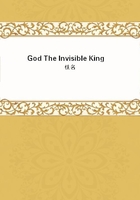
第22章
The disputes in theory--I do not say the difference in reality--between the modern believer and the atheist or agnostic--becomes at times almost as impalpable as that subtle discussion dear to students of physics, whether the scientific "ether" is real or a formula. Every material phenomenon is consonant with and helps to define this ether, which permeates and sustains and is all things, which nevertheless is perceptible to no sense, which is reached only by an intellectual process. Most minds are disposed to treat this ether as a reality. But the acutely critical mind insists that what is only so attainable by inference is not real; it is no more than "a formula that satisfies all phenomena."But if it comes to that, am I anything more than the formula that satisfies all my forms of consciousness?
Intellectually there is hardly anything more than a certain will to believe, to divide the religious man who knows God to be utterly real, from the man who says that God is merely a formula to satisfy moral and spiritual phenomena. The former has encountered him, the other has as yet felt only unassigned impulses. One says God's will is so; the other that Right is so. One says God moves me to do this or that; the other the Good Will in me which I share with you and all well-disposed men, moves me to do this or that. But the former makes an exterior reference and escapes a risk of self-righteousness.
I have recently been reading a book by Mr. Joseph McCabe called "The Tyranny of Shams," in which he displays very typically this curious tendency to a sort of religion with God "blacked out." His is an extremely interesting case. He is a writer who was formerly a Roman Catholic priest, and in his reaction from Catholicism he displays a resolution even sterner than Professor Metchnikoff's, to deny that anything religious or divine can exist, that there can be any aim in life except happiness, or any guide but "science." But--and here immediately he turns east again--he is careful not to say "individual happiness." And he says "Pleasure is, as Epicureans insisted, only a part of a large ideal of happiness." So he lets the happiness of devotion and sacrifice creep in. So he opens indefinite possibilities of getting away from any merely materialistic rule of life. And he writes:
"In every civilised nation the mass of the people are inert and indifferent. Some even make a pretence of justifying their inertness. Why, they ask, should we stir at all? Is there such a thing as a duty to improve the earth? What is the meaning or purpose of life? Or has it a purpose?
"One generally finds that this kind of reasoning is merely a piece of controversial athletics or a thin excuse for idleness. People tell you that the conflict of science and religion--it would be better to say, the conflict of modern culture and ancient traditions--has robbed life of its plain significance. The men who, like Tolstoi, seriously urge this point fail to appreciate the modern outlook on life. Certainly modern culture--science, history, philosophy, and art--finds no purpose in life: that is to say, no purpose eternally fixed and to be discovered by man. A great chemist said a few years ago that he could imagine 'a series of lucky accidents'--the chance blowing by the wind of certain chemicals into pools on the primitive earth--accounting for the first appearance of life; and one might not unjustly sum up the influences which have lifted those early germs to the level of conscious beings as a similar series of lucky accidents.
"But it is sheer affectation to say that this demoralises us. If there is no purpose impressed on the universe, or prefixed to the development of humanity, it follows only that humanity may choose its own purpose and set up its own goal; and the most elementary sense of order will teach us that this choice must be social, not merely individual. In whatever measure ill-controlled individuals may yield to personal impulses or attractions, the aim of the race must be a collective aim. I do not mean an austere demand of self-sacrifice from the individual, but an adjustment--as genial and generous as possible--of individual variations for common good.
Otherwise life becomes discordant and futile, and the pain and waste react on each individual. So we raise again, in the twentieth century, the old question of 'the greatest good,' which men discussed in the Stoa Poikile and the suburban groves of Athens, in the cool atria of patrician mansions on the Palatine and the Pincian, in the Museum at Alexandria, and the schools which Omar Khayyam frequented, in the straw-strewn schools of the Middle Ages and the opulent chambers of Cosimo dei Medici."And again:
"The old dream of a co-operative effort to improve life, to bring happiness to as many minds of mortals as we can reach, shines above all the mists of the day. Through the ruins of creeds and philosophies, which have for ages disdained it, we are retracing our steps toward that height--just as the Athenians did two thousand years ago. It rests on no metaphysic, no sacred legend, no disputable tradition--nothing that scepticism can corrode or advancing knowledge undermine. Its foundations are the fundamental and unchanging impulses of our nature."And again: